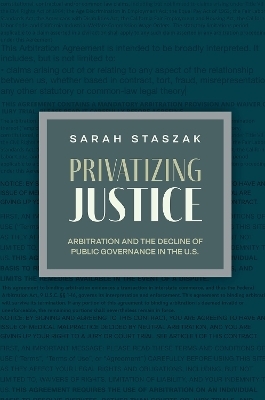
Privatizing Justice
Oxford University Press Inc (Verlag)
978-0-19-777173-0 (ISBN)
How did arbitration shift from providing a low cost, less adversarial, and more efficient way of handling disputes between entities of equal bargaining power to a private, non-reviewable, compulsory forum for resolving disputes between individuals and corporations, often on unilateral terms? By examining the broader institutional, political, and legal dynamics that shaped and enabled these processes of change over the past 150 years, Privatizing Justice examines how this transformation came about. The product of a broad range of actors and institutions interacting with each other--Congress, presidents, the courts, the administrative state, interest groups, and the business community-the system that emerged has not only transformed the American state in profound ways but exacerbated economic inequality and eroded democracy.
Sarah Staszak received her PhD in Politics from Brandeis University and is a Research Scholar in the Princeton School of Public and International Affairs. Her research and teaching interests include public law, policy, and American political development. She is the author of No Day in Court: Access to Justice and the Politics of Judicial Retrenchment (Oxford University Press, 2015; Co-Winner: 2017 J. David Greenstone Book Award for best book in politics and history awarded by the American Political Science Association). Sarah was previously a Robert Wood Johnson Scholar in Health Policy Research at Harvard University and a Brookings Institution Research Fellow in Governance Studies.
Chapter 1-Introduction
PART I: Arbitration's Institutional Orders
Chapter 2 Collective Bargaining and Labor's Industrial Democracy
Chapter 3 Disjointed Origins: The Rise of Commercial and Securities Arbitration
PART II: The First Wave: The Bipartisan Origins of Arbitration's Conversion
Chapter 4 Employment Rights as Civil Rights
Chapter 5 The Consumer Rights Movement
PART III: The Second Wave: The Partisan Politics of Modern Arbitration
Chapter 6 Privatizing the Workplace in the New Millennium
Chapter 7 Beware the Fine Print ("By opening and using this product, you agree to be bound
by mandatory arbitration")
Chapter Conclusion
| Erscheinungsdatum | 25.04.2024 |
|---|---|
| Reihe/Serie | Studies in Postwar American Political Development |
| Verlagsort | New York |
| Sprache | englisch |
| Maße | 157 x 241 mm |
| Gewicht | 454 g |
| Themenwelt | Recht / Steuern ► EU / Internationales Recht |
| Recht / Steuern ► Privatrecht / Bürgerliches Recht ► Zivilverfahrensrecht | |
| Sozialwissenschaften ► Politik / Verwaltung ► Vergleichende Politikwissenschaften | |
| ISBN-10 | 0-19-777173-4 / 0197771734 |
| ISBN-13 | 978-0-19-777173-0 / 9780197771730 |
| Zustand | Neuware |
| Informationen gemäß Produktsicherheitsverordnung (GPSR) | |
| Haben Sie eine Frage zum Produkt? |
aus dem Bereich


